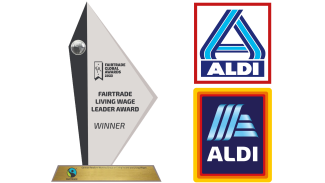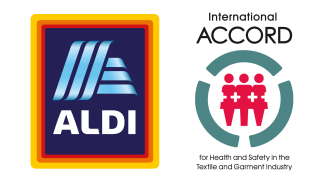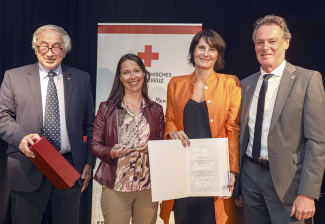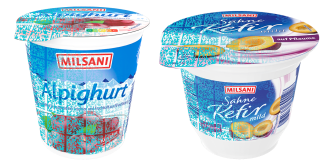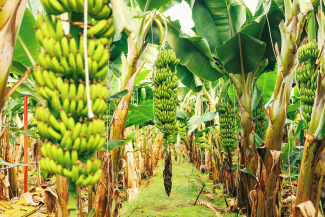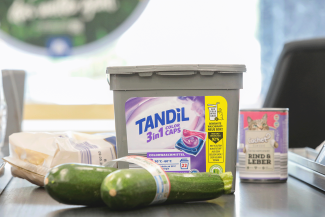
Vision 2030
Making sustainability affordable to our customers.
Our Approach
The ALDI SOUTH Group has always prided itself in making quality products available to its customers at the right price. For the past ten years, we have been successfully implementing responsible business activities and programmes. Through our Vision 2030 of ‘making sustainability affordable’, we will continue to give our customers access to great products, and we will reassure them that they have been responsibly sourced. By addressing social and environmental problems where they are most pressing, we can use our influence to have the greatest impact on people and the planet.
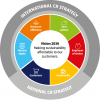
Our global CR Strategy consists of four international focus areas – human rights, resource efficiency, zero carbon, and employer of choice - and is complemented by additional national focus areas, which concentrate on giving all customers access to healthy products and supporting local communities. All these activities contribute to the overall vision of making sustainability affordable to every customer. Our new 2030 vision prepares us for the future and considers relevant trends and opportunities currently being presented on a global scale.

"Our ambitious goals require close cooperation with both our business partners and the retail industry. Together we can overcome global challenges and ensure that ALDI can contribute to the democratization of sustainable products, make them affordable, and bring them into any household and onto everybody’s plate.”
Anke Ehlers, Managing Director of Corporate Responsibility International at the ALDI SOUTH Group.
Our Global Focus Areas
Human Rights
We are committed to respecting human rights and improving living and working conditions throughout our supply chains. Our commitment encompasses any adverse impact on human rights that we might cause, contribute to or are directly linked to.
In order to make a real difference, we have established a wide range of partnerships with organisations including suppliers, manufacturers, retailers, governments, and NGOs. Together we can improve the lives of workers and their families in many different ways; these include promoting better working and living conditions for workers and their families, paying fair wages, empowering women, clamping down on child labour and increasing the transparency in our supply chains.

Resource Efficiency
Sustainable buying practices are essential for the long-term success of our business. Together with our business partners, we work towards increasing transparency and continuous improvement within supply chains.
We want to increase the share of sustainable products available to our customers. Our aspiration is that our products are made in a sustainable way and that we consider environmental and social criteria in our global supply chains - from raw materials to final production.
We will reduce food waste across our business, make other operational waste reusable or recyclable, reduce our own-brand product packaging weight and make the packaging we use 100% reusable, recyclable or compostable.

Zero Carbon
Our business activities have a significant impact on climate and the environment. This is a result not only of the products we sell, but also our business operations. Our goal is to minimise the ecological footprint of our corporate activities by lowering our greenhouse gas emissions and ensuring that the products we offer do not have a detrimental impact on the environment.
As part of our wider commitment to minimise the impact of our products, we will also work with our business partners to reduce their greenhouse gas emissions and promote climate protection projects in our supply chains.

Employer of choice
Our employees are the key to our success. They are the ones who define the ALDI business day after day and distinguish us from our competitors. For ALDI to continue on its path of success, we want to provide a great place to work and be an employer of choice within the retail sector. Our conviction is that understanding, respecting and valuing the uniqueness of our employees makes us stronger.
We are committed to invest in our employees inside and outside of work by creating a positive environment and offering programmes that support our employees’ mental, emotional and physical well-being. Our focus is to ensure that each colleague receives the opportunity to grow and develop within their role. For this reason, the ALDI Academy was implemented in all countries. The purpose of the Academy is to enrich the ALDI employment experience by creating tailored training and development programmes.
Our Global Employee Engagement Surveys regularly gather views and feedback on what we do well and where we can improve. This allows us to listen to our employees’ voice and develop international action plans so that we can provide a healthy, safe, and diverse workplace.
Materiality & Stakeholder Engagement
Our business can have either a positive and negative impact on many different groups of people, ranging from employees, to customers, business partners and workers in the supply chain. As a result, we must always take into account how our actions will impact them.
We carefully considered different sources and perspectives when developing our International CR Strategy and Vision 2030. Our global focus areas and strategic goals were identified through environmental and human rights risk assessments in our food and non-food supply chains. A broad-based International Stakeholder Surveys helped us to identify key priorities of consumers, suppliers, employees, as well as NGOs.
Stakeholder engagement is a central part of how we will deliver our Vison 2030. Whilst we are a global retailer, we know that many of our goals cannot be achieved alone. We collaborate with our stakeholders and exchange knowledge, resources, and competencies to encourage sustainable development.
We review our strategic approach regularly, considering all relevant internal and external developments. This allows us to ensure that our strategic priorities continue to focus on the areas which are most material to our business, and where we can have the greatest impact on society and the environment. The next comprehensive strategy review is planned for 2023.
International CR Stakeholder Survey
Building relationship with key stakeholders is critical to further drive change towards sustainable development. A strong and effective tool to engage with a broad variety of stakeholders is our International CR Stakeholder Survey.
This quantitative online survey combined with qualitative expert interviews, was conducted in early 2022 in partnership with GlobeScan.

The objectives of the survey were to:
- Highlight the sustainability issues of greatest importance to internal and external stakeholders today and in the medium term
- Give ALDI the opportunity to learn about any concerns stakeholders might have
- Provide the foundation for developing and reviewing our strategy
- Discover how ALDI is perceived to be performing regarding sustainability
- Strengthen our stakeholder engagement
Materiality Matrix
The International CR Stakeholder Survey focused on the areas of our International CR Strategy – human rights, zero carbon, resource efficiency, employer of choice, customers, and communities – and included 31 wide-ranging topics. These issues have been identified based on best practices (retail-specific sustainability and ESG topics) and the greatest impact on the business.
The materiality matrix represents the most important strategic issues:
- Y-axis: Importance for ALDI to address the issue, based on external stakeholders’ input (consumers, suppliers, and NGOs)
- X-axis: Perceived influence on ALDI's business success, based on ALDI employees’ input

Key Results
The materiality matrix shows that ALDI has been focusing on the right sustainability issues and that we are largely in line with the expectations of internal and external stakeholders. However, certain areas come through stronger than in the previous Stakeholder Surveys, such as in the area of biodiversity and sustainable farming. These findings will be incorporated into the ongoing review process of our International CR Strategy.
With the International CR Stakeholder Survey, we also wanted to use the opportunity to better understand how we are perceived as a business.
ALDI performs particularly well on “business ethics and integrity”, with stakeholders showing confidence in our overall commitment and consistent standards across sustainability. Over half of our stakeholders rated ALDI as a company that acts extremely or very responsibly.

Stakeholder Dialogue
We believe that collaboration is key in achieving sustainable development and change can only happen by working with all affected parties. Working with external partners and engaging in multi-stakeholder initiatives (MSIs) broadens our horizon and supports us to integrate different perspectives in our Vision 2030. We engage with several critical and supportive stakeholders (e.g. NGOs, MSIs, policy makers) to achieve common goals and seek to build greater awareness on current and future challenges along our supply chains and throughout our company.
We are regularly engaging with 45+ multi-stakeholder initiatives and are part of 10+ working groups, while also supporting 15+ projects on the ground for our high-priority supply chains. For some of these stakeholders (e.g., Oxfam, Fairtrade), detailed stakeholder engagement plans have been implemented.
Our Objectives & Performance
By measuring our Corporate Responsibility objectives and performance on a regular basis, we are continuously validating the effectiveness of our actions, highlighting the areas where we are already making progress and identifying areas where further action is still required. As a global retailer, we want to use our global buying power and market influence to create lasting change for a better future. We focus our activities on high-priority raw materials and commodity groups.
Our Projects

International organisation
ALDI CR offices in Asia
Each of the ALDI SOUTH Group’s national organisations sources products from Asia. To minimise the risks related to working conditions and to ensure compliance with our high standards, the ALDI SOUTH Group, together with ALDI Nord, has been operating its own CR office in Hong Kong since 2012 and established a second CR office in Bangladesh in 2017.
The focus of these CR offices is to monitor our business partner’ production facilities and the performance of our business partners with regard to social compliance. For this purpose, the CR offices conduct our own ALDI Social Assessments in the production facilities used for ALDI production and provide support to business partners on how to implement our CR requirements.

Project in Côte d'Ivoire
PRO-PLANTEURS project
Since 2015, as a member of the German Initiative on Sustainable Cocoa (GISCO) we have worked in partnership with the German government and the government of Côte d'Ivoire in a joint project. PRO-PLANTEURS works together with 25,000 cocoa farmers, including female farmers, their families, and their cooperatives. Successes of the first project phase were
- Professionalisation of cooperatives
- Increase in farmers’ cocoa yields
- Farmer training in Good Agricultural Practices and professional business management
- Diversification of agricultural production and nutrition.
In the PRO-PLANTEURS project, women are specifically trained on good nutrition and the cultivation of food crops for their own use. This allows women to be more financially independent by selling and consuming the harvest of food crops.
In June 2020, PRO-PLANTEURS started its second project phase with a focus on contributing to better living and working conditions of about 30,000 cocoa farmers.
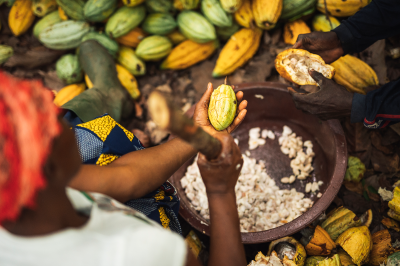
Engagement in Côte d'Ivoire
Fairtrade Impact Report
Last year, the ALDI SOUTH Group, Fairtrade and the Fairtrade cocoa cooperative ECAMOM started a monitoring report to improve the working conditions and livelihoods of local cocoa farmers in Côte d’Ivoire. Now the first impact report “Building Trust. Creating Impact.” has been published.
The first impact report serves as a baseline to provide insights into the work of the cooperative and the farmers, and identifies the challenges they are facing. We aim to provide a picture of what cocoa farming looks like today, and highlight potential areas of opportunities that can enable a long-term partnership between the stakeholders involved in the supply chain.
Read the report: Building trust. Creating impact. First Year Impact Report

Project in Ghana
Income Diversification project
In 2020, the ALDI SOUTH Group has joined forces with the chocolate producer Barry Callebaut and the Cocoa Horizons Foundation to support Ghanaian cocoa farmers to generate alternative income sources to cocoa. The two-year project is co-funded by the Belgian initiative ‘Beyond Chocolate, which is funded by the Belgian Ministry of Foreign Affairs and coordinated by IDH, the Sustainable Trade Initiative.
Activities in the project
The project is intended to support achieving the living income target of ‘Beyond Chocolate’. Within the first year, the following activities were conducted:
- Financial inclusion: 76 ‘Village Saving and Loans Associations (VSLAs)’ were formed to empower women and young people to invest in enterprises and households.
A VSLA provides access to finance in a safe, convenient, and flexible way by pooling together savings and raising resources in a group. It is a low-cost financial service, designed for farmers with irregular income, for example due to the cocoa season, in order to enable continuous solvency and business investments and to improve their family’s livelihoods or to fund household needs.
1008 farmers have benefited from the VSLA training activities so far. By the end of the two-year project, 77 VSLAs will have been founded. - Rejuvenation of cocoa farms: Community nursery projects have started, with the seedlings ready to be planted in the upcoming rainy season. Approximately 80 households will benefit from the rejuvenation of 41 hectares of old cocoa farms.
- Land ownership: Approximately 500 farmers will be provided with official land titles to secure ownership and allow long-term investments on farms by the end of the project. 310 farmers have already signed up. In the first project year, engagement with authorities and government agencies has been achieved.
- Income diversification: Around 110 households were supported in setting up alternative income sources via poultry farming. A second wave of 300 farmers are being currently trained and equipped for poultry farming. Poultry farming is a great alternative as it is less laborious, quick, and a sustainable means to generate income and to bridge the purchasing parity gap, especially when cocoa is out of season.
- Cooking stoves: 580 cooking stoves were distributed to families. The stoves significantly reduce the amount of wood needed to cook, leading families to need less time to cook and a reduced risk for deforestation. The total target is to distribute 500 cooking stoves.
The project is implemented by the Cocoa Horizons Foundation, an independent, non-profit organisation with the purpose to drive cocoa farmer prosperity by creating self-sustaining communities that protect children and nature. Via Barry Callebaut, ALDI is sourcing cocoa from farmers, which benefit from the Cocoa Horizons programme. ALDI customers can enjoy this sustainable product, the Belgian Seashells, during the Christmas season and contribute to a brighter future for cocoa farming communities in Ghana. We are committed to promote and offer products to our customers that are sourced from supply chains supporting a living income and have a decent standard of living for farmers.
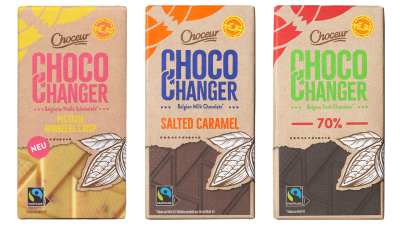
Mission Ally of Tony’s Open Chain
Chocolate bar: Choceur CHOCO CHANGER
A sweet taste, a delicious smell and a little bit(e) of happiness: We are excited to launch our new, responsibly sourced chocolate bar: Choceur CHOCO CHANGER. Our customers’ choice is empowering cocoa farmers in West Africa. Together, we can amplify our positive impact on cocoa farmers and change the norm in the cocoa industry by working on ending poverty, illegal child labour, and deforestation.
As the first international discount retailer to join Tony’s Open Chain in December 2020, ALDI is committed to support Tony’s Open Chain’s ambitious mission to change the norm in the cocoa industry by improving the working conditions along the supply chains and by collaborating in the transparent sourcing of cocoa beans. The cocoa beans for the Choceur CHOCO CHANGER are sourced via Tony’s Open Chain and its 5 Sourcing Principles.
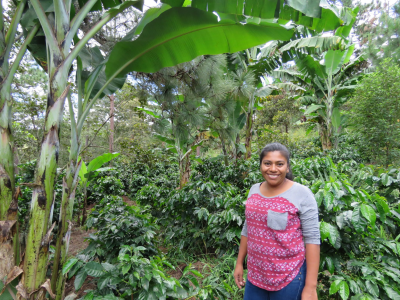
Project in Honduras
Fairtrade coffee project
The ALDI SOUTH Group has been sourcing Fairtrade-certified coffee from Honduras since 2014. Coffee is the most important agricultural export product from Honduras with over 100,000 families growing coffee and over one million people employed by the sector during harvest. Coffee farmers in Honduras face strong challenges resulting from a volatile political situation, high poverty rates, and fluctuation in price on the world market, and the growing effects of climate change.
Project aim
Since 2016, ALDI SOUTH has funded a project initiated by Fairtrade to support coffee cooperatives in Honduras. The project aims to
- improve the administrative and organisational capacities of smallholder producers,
- increase the amount of sustainable coffee production by smallholders and their resilience to climate change,
- increase coffee quality, sales and marketing capacities of cooperatives, and
- integrate vulnerable groups (women, youth, children, workers, indigenous people) more strongly into development and decision-making processes, the implementation of policies and advocacy initiatives at community level.
The Fairtrade premium which is paid to cooperatives for each Fairtrade certified product as well as ALDI’s additional project funds, enable solutions to be found for the above-mentioned challenges, and ensure the long-term sustainability of smallholder coffee production in Honduras. Through these efforts, farmers will become more resilient and prosperous so that a daily cup of coffee purchased from ALDI remains sustainable for all.

Project in Morocco
Fishery improvement project
The project aims to sustainably improve fishery management in order to ensure fishing practices, which comply with the MSC criteria in the long term. In 2014, the ALDI SOUTH Group initiated this project concerning the active improvement of the sustainability of sardine fishing in Morocco.

ALDI UK
Farm Africa Project in Western Kenya
In 2016, ALDI UK became the first UK supermarket to team up with international development charity Farm Africa in a three-year partnership to support young farmers in Kenya. ALDI funds the Growing Futures project to educate and improve the lives of more than 450 young people in Kitale, Western Kenya.
The project trains young people how to grow high-quality crops, like green beans, tomatoes and kale, as well as how to run their farms as businesses. As well as assisting young farmers to improve the quality and amount of food they produce, the project will help ensure they are growing the most valuable crops, support them in finding the best contracts, and enable them to sell crops at higher value markets so they can find a lasting way out of poverty.
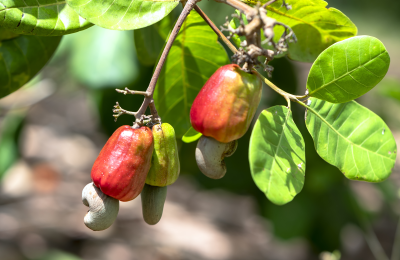
Project in Vietnam
Social Dialogue in cashew supply chains
ALDI seeks to respect human rights and prevent violations in our Vietnamese cashew nut supply chain by supporting the Ethical Trade Norway’s Cashew project. The project strengthens labour standards while having a focus on women and vulnerable groups as well as improves environmental management.
Together with our cashew suppliers, ALDI encouraged processors in the Vietnamese cashew supply chain to participate in social dialogue training during September and November 2019. This training was designed to improve worker and management dialogue, grievance handling and knowledge of trade union rights. The project also trained farmers on labour standards, good agricultural and environmental practices. Additional sessions and supplementary trainings for further Vietnamese supply chain actors followed in July 2020. The project will continue to support farmers, workers and processors over the course of this year with further guidance and knowledge-sharing.

Project in Côte d'Ivoire
Palm oil smallholder project (2017-2021)
Between 2017-2021, the ALDI SOUTH Group, together with ALDI Nord, supported a smallholder project in Côte d'Ivoire in order to pave the way for sustainable cultivation of palm in the area. In close cooperation with our partner Solidaridad, we developed a project that focused on improving smallholder farmers’ knowledge on Best Environmental Practices and on agriculture that respects High Conservation Values (HCV) and natural forests.
Solidaridad offereds training through Farmer Field Schools (FFS) for 2,611 palm oil smallholder farmers and helped restore approximately 250 hectares of forest land in the project area. The team cultivated 17,532 tree seedlings in nurseries that were then distributed to individual farmers, planted in schools and borders of sacred forests, and used to help restore natural reserve areas.
Various partners and stakeholders were involved in the project, including the Inter-professional Association of Oil-Palm Industry (AIPH). This institution has fully endorsed the project’s outcomes and is now installing tree nurseries in other palm oil-growing regions. Additionally the cooperatives engaged are were COOPALEN, UCCOPES, COOPTOSA from the Sud Comoe region, UCOOPALM from the Grand Ponts region, USCOPAHLD from Loh Djiboua and U3SC from San Pedro.
Despite the many challenges facing the project, including COVID-19 restrictions, and political tensions, 90% of the community participants, including community leaders and the youth, reported positive outcomes of the project in the area and increased knowledge from the trainings.

Project in Bangladesh
ALDI Factory Advancement (AFA) Project (2013-2020)
ALDI is committed to promoting human rights in the garment industry. With the ALDI Factory Advancement (AFA) Project, the ALDI SOUTH Group, together with ALDI Nord, has introduced a programme which delivers change in factories that produce our garments in Bangladesh.
Running from 2013 to 2020, the AFA Project placed factory workers and managers at the centre of its activities to find sustainable solutions for improved workplaces. Its core principle was the promotion of dialogue and cooperation between workers and managers. To date, approximately 85,000 workers and their managers of 40 participating factories have benefitted from the project and experienced positive changes in their day-to-day working environment.

Project in Bangladesh
AFA Project Plus for child care services (2016-2019)
From 2016 until 2019, the AFA Project PLUS addressed the critical need for quality childcare for the children of working parents in factories that produce our textile goods in Bangladesh. ALDI supported selected factories participating in the AFA Project in improving their internal day-care services.
Many workers are reliant on these services due to financial constraints and a lack of alternative care options. Together with local non-governmental organisations, we trained caregivers, childcare centre supervisors, nurses and parents working at the factory.
COVID-19 emergency relief in Bangladesh & Myanmar
ALDI & CARE support female garment workers
The impact of the COVID-19 pandemic on garment workers has been devastating. Women make up the majority of the garment sector workforce and they have been affected the most. In 2020, CARE International and the ALDI SOUTH Group teamed up to protect the rights and needs of women in the garment sector in Bangladesh and Myanmar during the pandemic.
These efforts resulted in nearly 5,000 female workers receiving hygiene kits while 1,600 workers received household handwashing facilities in Bangladesh. In Myanmar, we were able to reach more than 76,000 factory workers with sanitising and disinfecting materials and provided face masks for more than 28,000 workers.

Project in Tajikistan and Kyrgyzstan (2018-2021)
Fairtrade project on cottonseed
From 2018-2021, ALDI SOUTH Germany supported the Fairtrade cottonseed project in Tajikistan and Kyrgyzstan. The project aimed to empower smallholder farmers and to improve the quality and supply of non-GMO cotton from Central Asia.
To reach the project goal the following measures were implemented:
- Training of farmers on seed production and multiplication
- Actions to combat GMO-contamination
- Enlargement of cultivable acreage for organic cotton and yield
- Knowledge management and sharing
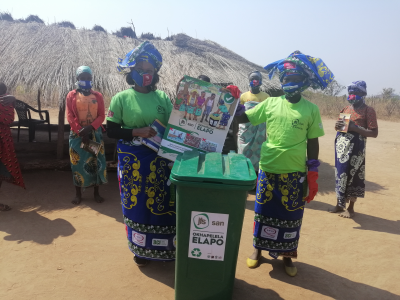
Project in Mozambique
Cotton made in Africa recycling project
In 2019, Cotton made in Africa (CmiA) and the local cotton company SAN-JFS developed a recycling project in Mozambique. This project supports women from local farming communities who operate eco-collection points. Over 72,000 empty pesticide containers were collected and sent for recycling in the first year and benefitted up to 20,000 farmers. With the exclusive support of ALDI, the project is able to continue into a second phase and benefit even more farmers.

ALDI SOUTH Germany & HOFER S/E
Sustainable charcoal from Namibia (2019-2020)
From 2019-2020, ALDI SOUTH Germany and HOFER S/E worked with the Forest Stewardship Council (FSC) in Namibia. The aim of the project was to increase the amount of sustainable and directly traded charcoal on the market, which benefits local farmers directly. After the successfully conclusion of trainings and audits, the farmers are certified according to the FSC Forest Management Standard.

Project in Brazil
Forest protection
According to our CR Principles, the ALDI SOUTH Group is striving to be a carbon-neutral company. Following a significant reduction of greenhouse gas (GHG) emissions and the use of renewable energy across the Group, several ALDI SOUTH countries are climate neutral. Carbon offsets make up for the rest by funding environmental projects.
To continue to deliver against our broader climate target, we are supporting an environmentally-focused project.
Forest protection in Brazil
Forests are not only among the planet's most important carbon reservoirs. They are also home to an enormous diversity of species and are the livelihood for local communities. This project is offering land to small farmers instead of soy plantations. The aim is to continue to preserve the rainforest and to provide its inhabitants - the “Ribeirinhos” - with land rights. This secures the livelihood of the local residents and saves around 3,000 hectares from deforestation.

Project in Ghana
Clean cook stoves
According to our CR Principles, the ALDI SOUTH Group is striving to be a carbon-neutral company. Following a significant reduction of greenhouse gas (GHG) emissions and the use of renewable energy across the Group, several ALDI SOUTH countries are climate neutral. Carbon offsets make up for the rest by funding environmental projects.
To continue to deliver against our broader climate target, we are supporting an environmentally-focused project.
Clean cook stoves in Ghana
In many of the world's poorer regions, families cook their meals over an open fire, often in enclosed spaces. This method of cooking is not energy efficient as large amounts of heat go to waste. Clean cooking stoves are simple devices made from metal or clay. Thanks to their better heat isolation, the clean cooking facilities enable the reduction of charcoal usage of up to 40 %. This increases energy efficiency and decreases carbon emissions. Additionally the project helps to protect local forests, creates new job opportunities and improves health conditions for families.

Project in Uganda
Clean drinking water
According to our CR Principles, the ALDI SOUTH Group is striving to be a carbon-neutral company. Following a significant reduction of greenhouse gas (GHG) emissions and the use of renewable energy across the Group, several ALDI SOUTH countries are climate neutral. Carbon offsets make up for the rest by funding environmental projects.
To continue to deliver against our broader climate target, we are supporting an environmentally-focused project.
Clean drinking water in Uganda
A clean drinking water supply has positive effects both on the climate and the health conditions of local communities. Broken boreholes are identified, repaired and maintained, which gives people access to clean drinking water without having to boil it. The project saves the carbon emissions that would result from boiling water, usually on open fires or inefficient stoves. It also improves people's living conditions and protects local forests by reducing firewood consumption.

Project in India
Solar energy
According to our CR Principles, the ALDI SOUTH Group is striving to be a carbon-neutral company. Following a significant reduction of greenhouse gas (GHG) emissions and the use of renewable energy across the Group, several ALDI SOUTH countries are climate neutral. Carbon offsets make up for the rest by funding environmental projects.
To continue to deliver against our broader climate target, we are supporting an environmentally-focused project.
Solar energy in India
Replacing energy from fossil fuels with clean energy is an essential part of the fight against global warming. Since energy from solar panels is created without burning fossil fuels, it is considered emission-free. The solar power plant funded through this project contributes to making the Indian power grid greener. In addition, the operators of the plants are involved in various initiatives aimed at positively impacting the welfare of the local community.

Project in Haiti
Fight against plastic
According to our CR Principles, the ALDI SOUTH Group is striving to be a carbon-neutral company. Following a significant reduction of greenhouse gas (GHG) emissions and the use of renewable energy across the Group, several ALDI SOUTH countries are climate neutral. Carbon offsets make up for the rest by funding environmental projects.
To continue to deliver against our broader climate target, we are supporting an environmentally-focused project.
Fight against plastic
Over 8 million tonnes of plastic waste flows into the ocean each year - the equivalent of one truckload per minute. ‘Plastic Bank’ fights against the increasing amount of plastic in the world‘s oceans by offering money for plastic. The plastic is then recycled and turned into new products.

Project in the Philippines
Fight against plastic
According to our CR Principles, the ALDI SOUTH Group is striving to be a carbon-neutral company. Following a significant reduction of greenhouse gas (GHG) emissions and the use of renewable energy across the Group, several ALDI SOUTH countries are climate neutral. Carbon offsets make up for the rest by funding environmental projects.
To continue to deliver against our broader climate target, we are supporting an environmentally-focused project.
Fight against plastic
Over 8 million tonnes of plastic waste flows into the ocean each year - the equivalent of one truckload per minute. ‘Plastic Bank’ fights against the increasing amount of plastic in the world‘s oceans by offering money for plastic. The plastic is then recycled and turned into new products. At the same time, a wind farm project in the Philippines is supported to realize the actual reduction of carbon emissions.

Project in Indonesia
Fight against plastic
According to our CR Principles, the ALDI SOUTH Group is striving to be a carbon-neutral company. Following a significant reduction of greenhouse gas (GHG) emissions and the use of renewable energy across the Group, several ALDI SOUTH countries are climate neutral. Carbon offsets make up for the rest by funding environmental projects.
To continue to deliver against our broader climate target, we are supporting an environmentally-focused project.
Fight against plastic
Over 8 million tonnes of plastic waste flows into the ocean each year - the equivalent of one truckload per minute. ‘Plastic Bank’ fights against the increasing amount of plastic in the world‘s oceans by offering money for plastic. The plastic is then recycled and turned into new products.

Project in Brazil
Fight against plastic
According to our CR Principles, the ALDI SOUTH Group is striving to be a carbon-neutral company. Following a significant reduction of greenhouse gas (GHG) emissions and the use of renewable energy across the Group, several ALDI SOUTH countries are climate neutral. Carbon offsets make up for the rest by funding environmental projects.
To continue to deliver against our broader climate target, we are supporting an environmentally-focused project.
Fight against plastic
Over 8 million tonnes of plastic waste flows into the ocean each year - the equivalent of one truckload per minute. ‘Plastic Bank’ fights against the increasing amount of plastic in the world‘s oceans by offering money for plastic. The plastic is then recycled and turned into new products.
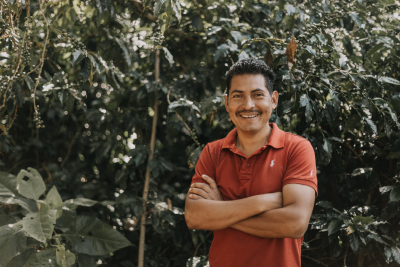
Project in Honduras
Living income gap project
The ALDI SOUTH Group is partnering with Olam Food Ingredients’ (“OFI”) coffee business on a four-year project in Honduras, which aims to narrow the living income gap by improving market access and coffee quality.
The new joint project aims to create a transparent and traceable coffee supply chain all the way to farm level, and narrow the living income gap of 1,000 coffee producers in Honduras by helping them to increase yields, improve coffee quality and achieve Rainforest Alliance certification. Local representatives and farmers will be trained with an innovative smartphone app that enables them to make informed decisions and directly trade their coffee with Olam. Over four years, each farmer will receive tailored trainings, agricultural inputs and tools to help narrow the living income gap.
Tracking the project’s progress will ensure we are not only meeting our shared goals but learning how to make our impact scalable in a way that lifts farmers out of poverty, and that offers a more promising future for generations to come.

Project in Thailand
Worker voice process
ALDI is partnering with the non-profit organization Issara Institute to provide support to both workers and businesses in our supply chain. We will be working together to provide access to grievance mechanisms and remediation actions in ALDI’s Thai food supply chains. The partnership will strengthen current processes and empower workers to speak up if they have concerns about their working environment.
It also helps ALDI to generate learnings on addressing potential barriers in accessing grievance mechanisms and remedy that different categories of workers are facing. For example, Issara supports gender-specific mechanisms by having trained male and female helpline operators and ensuring worker confidentiality and safety in reporting all issues such as harassment. Potential barriers are being addressed through remediating worker raised issues in collaboration with their employer and support of ALDI and its suppliers, for instance through building capacity to look into grievances, talking safely with workers or through other specific training by Issara Institute.
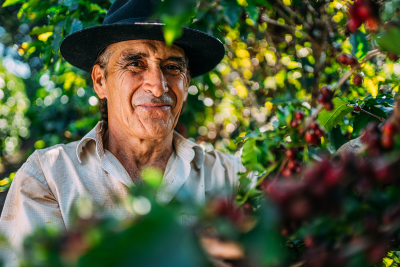
Project in Brazil
Ethical recruitment on coffee farms
Following the development of the Human Rights Impact Assessment (HRIA) action plan, ALDI is partnering with the non-profit civil society organisation Verité on a pilot project on “Promoting Ethical Recruitment in the Coffee Sector of Minas Gerais, Brazil” within Verité’s U.S. Department of Labor-funded Cooperation On Fair, Free, Equitable Employment (COFFEE) Project.
After conducting an HRIA on coffee in Brazil in 2021, ALDI is excited to be able to take immediate action through participating in Verité’s project in Brazil. The aim of this pilot is to better understand and respond to recruitment and labour risks in the Brazilian coffee sector.
The effort is part of Verité’s “COFFEE” Project, which includes pilot projects in Mexico, Colombia and Brazil, along with the development of an open-source Socially Sustainable Sourcing Toolkit (S3T) and online training modules focused on promoting decent labour conditions and fair recruitment in the coffee sector. The tools will be piloted by ALDI and its supply chain actors, such as coffee roasters, traders, and farms.
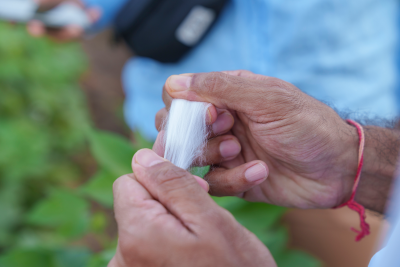
Project in India
Cotton in-conversion to organic project
In 2022, the ALDI SOUTH Group and ALDI Nord Group launched a project in India that supports approximately 1,000 smallholder farmers to move from conventional to organic cotton farming. We are pleased to be able to provide our customers with a number of different styles of cosy family pyjamas, made from the project’s cotton and will be available in several markets across Europe by the end of February 2023.
More
Currently organic cotton only accounts for approximately 1% of the global cotton market. Our long-term goal is to start to increase the availability of organic cotton. The use of organic agricultural practices reduces negative impacts on the wider environment, including those related to soil health, water quality and biodiversity, it also improves the livelihoods of farmers and positively impacts the health of local communities.
ALDI wanted to be part of the solution, this is why it has launched the Cotton in-conversion to organic project in collaboration with a number of organisations including the Deutsche Gesellschaft für Internationale Zusammenarbeit (GIZ) GmbH (on behalf of the German Federal Ministry for Economic Cooperation and Development (BMZ)).
The transition from conventional to organic cotton farming takes up to three years. This means that farmers only receive a higher price for their cotton once it is certified organic in the fourth year. This three-year transition is a major barrier for many smallholder farmers because during this time they will experience yield loss and higher production costs. ALDI supports these smallholder farmers during the transition period with training on agricultural practices, natural fertiliser, organic pesticides, soil fertility as well as provision of high-quality organic seeds. These activities are provided by implementation partners on the ground.
More Information
Sustainable Development Goals
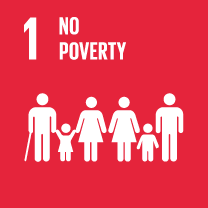
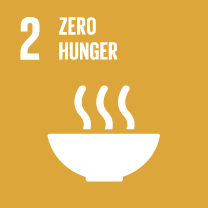
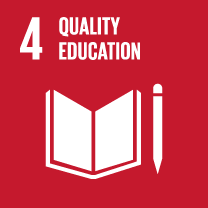
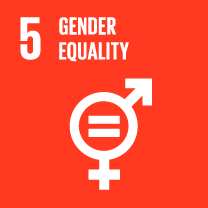
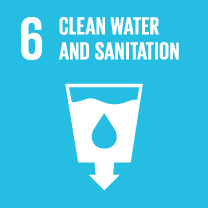
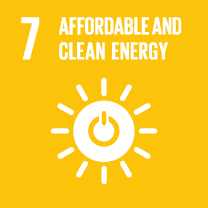
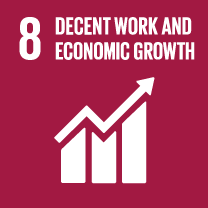
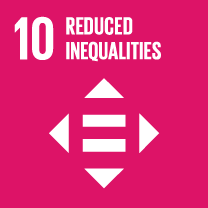
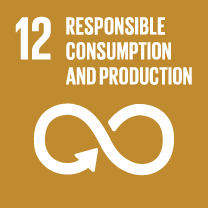
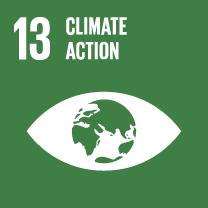
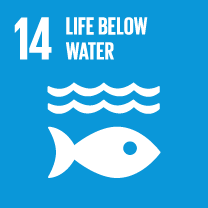
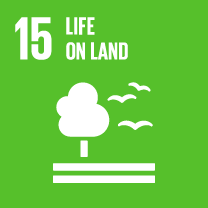
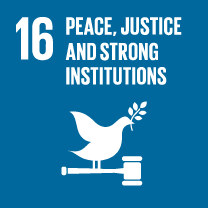
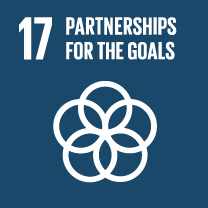
UNGC
Human Rights
Principle 1
Support and respect the protection of human rights
Principle 2
Not complicit in human rights abuses
Labour
Principle 3
Uphold freedom of association and recognition of right to collective bargaining
Principle 4
Elimination of forced and compulsory labour
Principle 5
Abolition of child labour
Principle 6
Elimination of discrimination in respect of employment and occupation
Environment
Principle 7
Precautionary approach to environmental challenges
Principle 8
Promote environmental responsibility
Principle 9
Development and diffusion of environmentally friendly technologies
